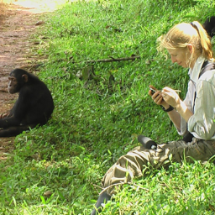Oxytocin & cooperative behaviour in wild chimpanzees: insights for other species

catherine Crockford
Institute of Cognitive Sciences, CNRS, Lyon, France
Link to seminar: https://umontpellier-fr.zoom.us/webinar/register/WN_8N7kZhNSQa2FhpSZeMUEhw
Summary
Aims. Social mammals can form close and enduring social bonds, where dyads with close social bonds are those that engage in high rates of grooming. Maintaining social bonds leads to greater reproductive success, health and longevity. However, underlying mechanisms promoting this effect are still ambiguous, especially for rarer non-kin, non-sexual bonds, such as seen in humans and chimpanzees. One possibility is that direct benefits are derived from cooperative exchange, which may be emotionally and cognitively mediated through oxytocin, a key neuropeptide in social bonding and a facilitator of social cognition. Another is that bond partners buffer the negative effects of physical and psychological stress, where prolonged cortisol release is associated with reduced fertility, health and longevity.
Methods My colleagues, Roman Wittig, Tobias Deschner, Liran Samuni, Anna Preis and I investigated these possibilities in chimpanzees, known for their unusual close social bonds with non-kin. Our team examined chimpanzee urinary glucocorticoid and oxytocin levels following several cooperative events, including those considered to be stressors (such as potentially lethal encounters with neighbouring chimpanzee communities, hunting monkeys or food competition contexts), or relaxers (grooming interactions). We contrasted these with socially neutral (resting, social feeding) situations or aggression.
Results Our results suggested that generally the combination of engaging in cooperative behaviours with bond partners compared with non-bond partners, rather than either factor alone, was associated with hormonal profiles likely to facilitate both cooperation with delayed returns and stress reduction.
Conclusions We propose that oxytocin may have been a facilitator in the evolution of non-kin cooperation.
Contact: marie.charpentier@umontpellier.fr
Contact du Comité SEEM: seem@services.cnrs.fr. Contact du Labex CEMEB: cemeb-gestion@umontpellier.fr


